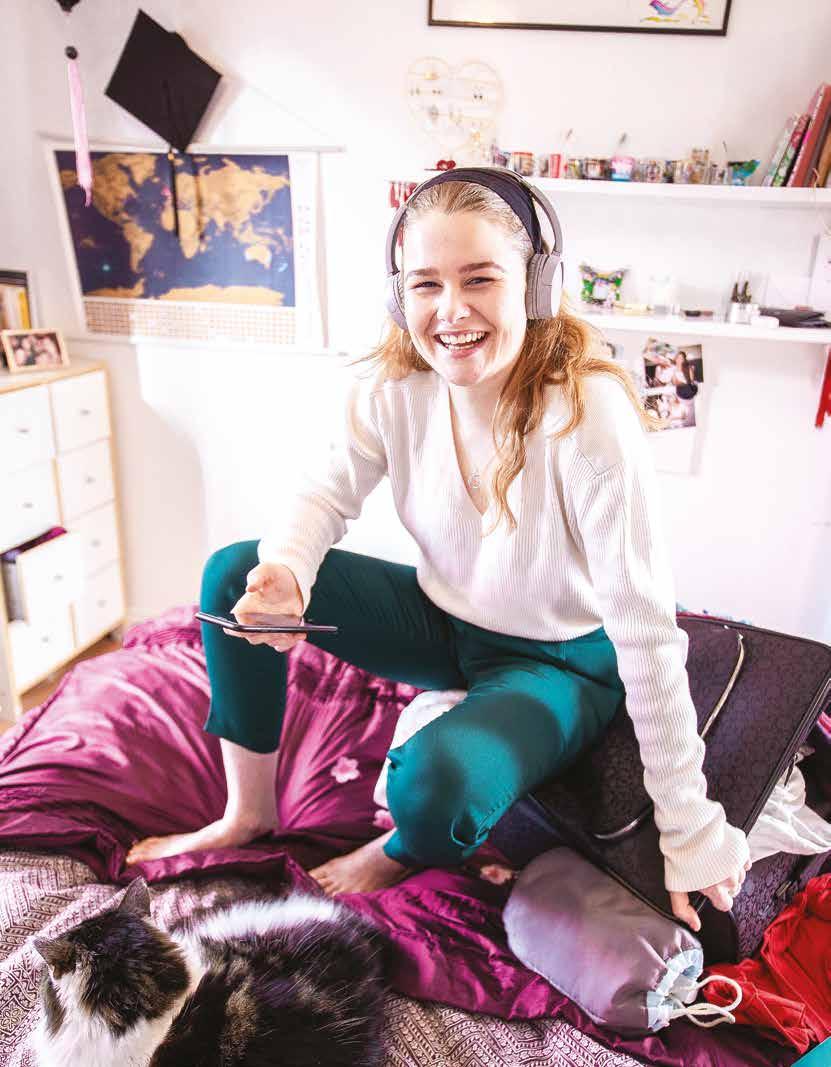
3 minute read
I FELT LIKE I WASN’T REALLY THERE
Yet six years ago she was strapped to a bed by the feet, bound across the chest and unable to move her arms. She was not experiencing some form of medieval torture, but was undergoing tests for a condition which had beleaguered her for a third of her life. The teenager was referred to a paediatrician for a raft of tests. “When the doctor asked me if my feet went purple in the shower, I knew he understood,” said Olivia. Her cardiologist suspected PoTS and the tilt test confirmed his diagnosis. Mild steroids were prescribed to help regulate salt levels and blood pressure. Olivia loves travelling. Her latest trip was to Australia and New Zealand following her graduation in March from the University of Maastricht in the Netherlands with a degree in European Law.
At 15 she’d already had years of losing consciousness, especially when she changed position from lying down or being seated to standing. The unusual strapping to the bed was for what doctors describe as the ‘tilt test’.
Olivia, now 22 was diagnosed with Postural Tachycardia Syndrome (PoTS) an abnormal increase in heart rate that occurs after sitting up or standing. It’s most common in girls and women aged 15 to 50. She won’t let PoTS interfere with her active lifestyle but knows the triggers and takes care with her diet, and exercises regularly.
Her symptoms began when she started high school. “If I was in one position for a long time, in a lesson or looking at the board, I would start to feel hot and then my vision would go – with dots and blurs in front of my eyes – and then I wasn’t really there.”
“It was when my dad saw it happen that people started to take it seriously. I had got up from the settee to switch the television off and next minute I nearly brought the TV down on top of me.” Olivia describes her condition as an ‘invisible illness’ because people rarely see what happens to her when she has an episode.
“I find I’m particularly susceptible when I eat dairy products and I make a point of trying to keep fit and active by working out at the gym. Exercise definitely works for me and I try to eat healthily wherever possible.”
• Stop press: Olivia’s latest trip was cut short by Coronavirus. She eventually secured a flight home, just 24 hours before the country went into lockdown. She arrived back in the UK only four hours before Prime Minister Boris Johnson announced his own strict measures.
Advice from the charity PoTs UK is that there is currently no clear evidence to suggest PoTS causes an increased risk of catching the virus although people with PoTs often report more severe symptoms from any cold or flu virus. Further information is available from potsuk.org or via their Facebook page.
WHAT IS PoTS?
Postural Tachycardia Syndrome (PoTS) can be a life altering and debilitating health condition. Simply standing up can be a challenge for affected people as their body is unable to adjust to gravity.
Normally when you sit up or stand, gravity pulls some of your blood down to your belly area, hands and feet. In response, your blood vessels quickly narrow and your heart rate increases slightly to maintain blood flow to the heart and brain, and prevent blood pressure dropping. This is all done by the autonomic nervous system which takes charge of automatic body functions. In PoTS, the autonomic nervous system does not work properly. There’s a drop in blood supply to the heart and brain when you become upright and the heart races to compensate for this.
TYPICAL SYMPTOMS INCLUDE:
• dizziness or light headedness
fainting
problems with thinking, memory and concentration – this combination of symptoms is often called ‘brain fog’
heart palpitations
shaking and sweating
weakness and fatigue (tiredness)
headaches
poor sleep
chest pain










